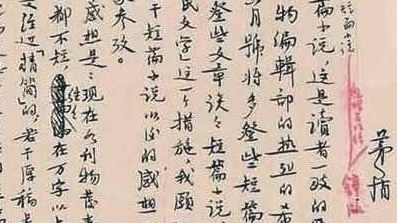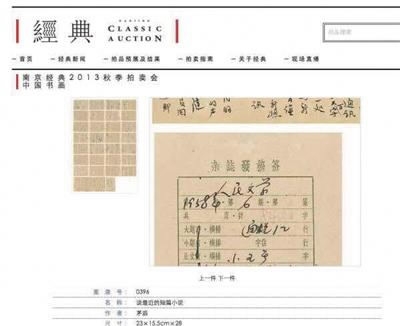

Auction company website screenshot (Photo/The Beijing News)
On Monday, the third court hearing over Chinese novelist Mao Dun's manuscript, which was put up at auction, was held in Nanjing's Liuhe District Court, as Mao's descendants believed the Nanjing Jingdian Auction Company had violated copyright by publishing the information and photos of the manuscript without permission.
Mao Dun was a novelist, cultural critic and served as the previous Culture Minister of China, and is considered as one of the most celebrated Chinese literary figures in mid-20th century. His most famous work is "The Midnight", which depicts life in cosmopolitan Shanghai.
Decades after Mao's death, one of his manuscripts, a 30-page editorial commenting on short novel writing in 1958, was put up at auction and sold for 120 million yuan (170,000 USD) in 2013. The sale made it the most valuable manuscript in China.
However, Mao's family believed the commercialization of the sale would ruin Mao's reputation, as people would use Mao's work as a way to make a big fortune. The Nanjing Jingdian Auction Company refused to withdraw the auction, prompting Mao's family to sue them, requesting a public apology and 500,000 yuan (72,000 USD) in compensation, and asked the auction company to stop promoting Mao's work.
"This manuscript is valuable because it is a hand-written article," said Zhang Limin, the director of Mao Dun Museum in Tong Xiang, Zhejiang Province. She indicated that this manuscript will be a first-class collection piece in the museum.
According to Zhang, there are approximately 500 of Mao's manuscripts preserved in the museum, but only three of them were labeled at first-class, and they were all donated by Mao's family.
"We never put his manuscripts up for auction. Everyone knows that," said Yang Yun, wife of Mao's grandson. Mao's family kept some of his remaining writings for themselves, and the rest were donated to museums. But the sale has hurt those who have been devoted to researching Mao's works in an academic capacity.
However, the auction was not successfully completed in 2014, as the buyer, surnamed Yue, did not pay the deposit on time. Yue could not afford the bill as he was in financial crisis at the time, so the auction company decided to return the subject to Zhang, who also became a new defendant in the third hearing.


















































